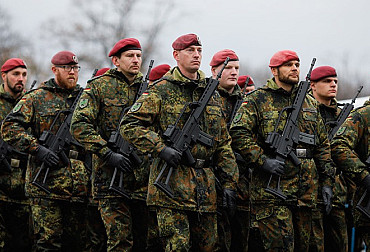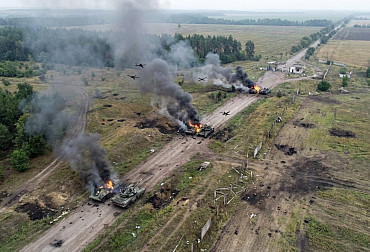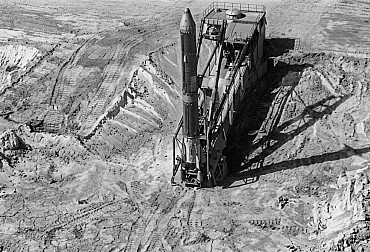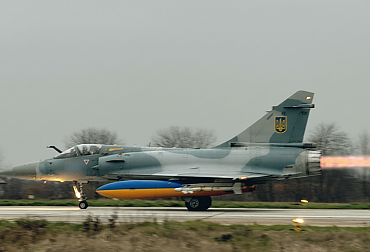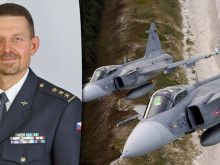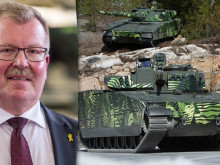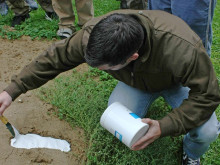Tomáš Pojar: Military and economic aid to Ukraine is in our interest and pays off handsomely both security-wise and economically
"The fact that we support Ukraine is economically very rational. It even brings us profit. But most importantly, supporting Ukraine saves us the costs that would be incurred if Ukraine collapsed economically and militarily," says National Security Advisor Tomáš Pojar in a candid balance sheet interview about the war in Ukraine and the situation in Israel.
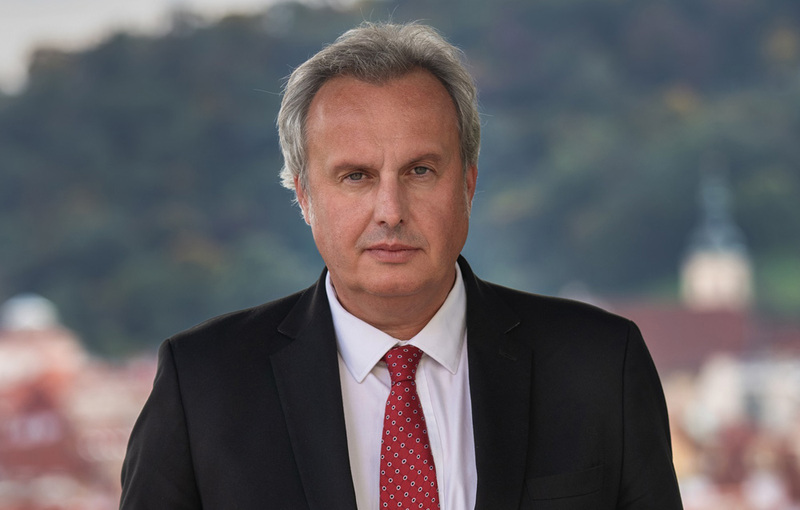
What was 2023 like from the perspective of the Czech Republic's National Security Advisor?
The hope that the momentum of the biggest conflict on the European continent since the Second World War - the Russian invasion of Ukraine - would subside has unfortunately not been fulfilled. At the same time, towards the end of the year, a brutal terrorist attack on Israel took place, rocking the entire Middle East. Last year was thus even more turbulent than the year before. And, unfortunately, there is no sign that we will have a quieter year this year. The world around us has been in turmoil for some time now, and we must learn to live with it and exert every effort to make things better, or at least not worse.
I read a sentence somewhere: 'The West is helping Ukraine not to succumb to Russia, but preventing it from defeating Russia'. Is there any truth in that statement?
It is certainly always the case that military support can be greater, but at the same time it does not mean that greater support would necessarily help Ukraine win without igniting a conflict beyond Ukraine's borders towards Europe. Of course, it is legitimate to ask whether we are doing everything we can and what makes sense. I am convinced that it is not in our interest for the conflict in Ukraine to flare up or significantly expand. At the same time, I do not believe that there is any weapon system that can be delivered to Ukraine that would be the proverbial game changer capable of ending the war with a quick Ukrainian victory.
Ukraine has long been asking the West for longer-range weapons so that it can attack occupied territories even in the rear of Russia. But so far without success. Is the fear of Russia's use of nuclear weapons still behind Germany's reluctance to provide these weapons?
If the West were to become directly involved in the war, the conflict would reach a radically different level, and we must prevent that. However, Ukrainian attacks on military targets inside Russia are, in my opinion, perfectly legitimate. Ukraine is attacking Russian territory and is able to do so with its own weapons, not Western ones. Given what Russia is doing in Ukraine, I am convinced that German Taurus missiles, as well as longer-range US ATACMS missiles, should already be in Ukraine as part of an adequate response. However, I do not believe that even the delivery of these missiles would automatically change the dynamics on the battlefield and mean any significant escalation of the conflict.
Last spring/summer's Ukrainian counter-offensive did not live up to expectations. You yourself repeatedly warned before its outbreak that optimistic expectations may not correspond to reality. Why did the Ukrainian offensive fail? And can we expect any more ambitious attempts to push the Russians out of Ukraine this year?
Quite frankly, I have no idea how the conflict will unfold, what the dynamics will be, or in what direction the front will move. A year and a half ago, I did not think that the Ukrainians would succeed in pushing the Russians away from Kiev and Kharkiv and liberating Kherson at the same time. The hopes placed in last year's counter-offensive were just driven by the fact that something like this could happen again and another breakthrough could occur. But attacking and pushing back an armed and numerically huge army that is well dug in in mined areas is difficult and only happens at the cost of immeasurable effort and enormous losses. The defensive lines that Russia has been systematically building for a long time have in most cases failed to be breached by the Ukrainians. I am convinced that Ukraine must now, on the contrary, build defensive lines to prevent the front line from moving westwards, while at the same time continuing to try to paralyse the Russian side so that somewhere, sometime in the future, there will be a Ukrainian breakthrough and a shift of the front line further east. But the Russian side is undoubtedly trying to do the same in reverse.
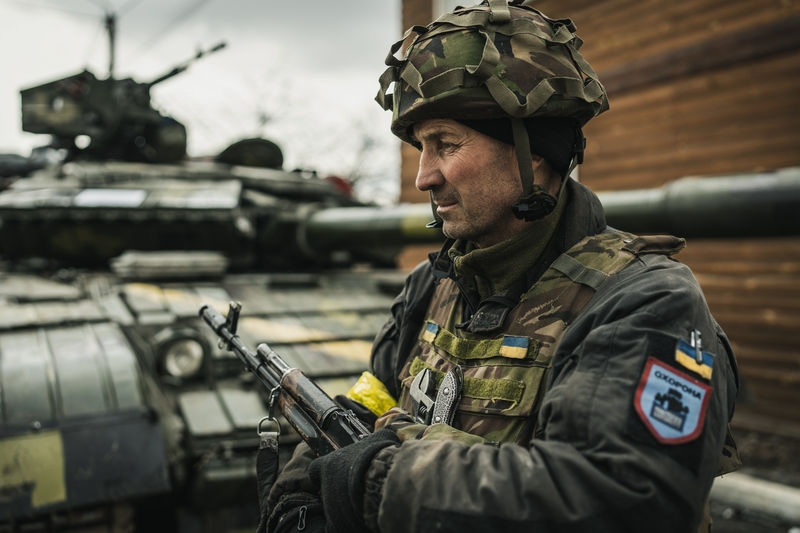
You have long pointed out that support for Ukraine is in our vital interest and that the conflict will eventually end the negotiations. But you stress that it is up to the Ukrainians themselves to decide when and under what conditions this will happen. But is it not the case that it is the West that determines the circumstances by the degree of its support?
If the West did not support Ukraine, Soviet and Russian troops would be on the Slovak border and there would be nothing to negotiate. And Slovakia would be next in line. It should be remembered that if Ukraine were to fall, the costs we would have to incur would be considerably greater because we would be facing a multi-million dollar refugee wave. It would also mean a significantly higher defence budget, and the costs, not just for the Czech taxpayer, would rise significantly.
The fact that we are supporting Ukraine is economically very rational. It even brings us a profit. But, above all, supporting Ukraine saves us the costs that would be incurred if Ukraine collapsed economically and militarily. If Western aid to Ukraine were to stop, it would lead to its economic collapse and, sooner or later, to the occupation of the whole of Ukraine. This would be accompanied by a massive refugee wave to the West, which would destabilise the whole of Central Europe.
It should be emphasised that a large proportion of Ukrainian refugees work in our country, pay taxes and insurance and, in general terms, contribute more than they take from us. Similarly, our military aid to Ukraine, which we organise, is mostly paid for from sources outside the Czech Republic. And these tens of billions of crowns end up in our economy, employing people and contributing to the competitiveness of the Czech defence industry. And it's not just the defence industry, because overall Czech exports to Ukraine are growing steadily, despite the ongoing war conflict. By the way, without Ukrainian wheat, food would probably be more expensive in the Czech Republic. Both military and economic aid to Ukraine is in our interest and pays off handsomely, both security-wise and economically.
The Chief of the General Staff of the Czech Armed Forces, Karel Rehka, in a discussion with the head of the NATO Military Committee, Rob Baur, at the CEVRO University, said that the conflict in Ukraine cannot be solved by negotiations because the Russian side is not interested in negotiations, cannot be trusted anyway, and the conflict must end with the withdrawal of Russian soldiers from its territory. How realistic is the idea that Ukraine will return to its pre-Russian aggression borders in 2014?
It is realistic, I just cannot say when it will happen. The Soviet Union also occupied the Baltic States and Czechoslovakia for decades in the past, and today these countries are free. It is desirable not to discount the goal of liberating Ukraine. On the other hand, if both sides reach a stalemate in the war and conclude a ceasefire, which by definition is always temporary, we should not prevent such a ceasefire. But that does not mean that Ukraine should in any way give up its territory. The reality is simply that wars usually end in various ceasefires and temporary borders.
From the Czech point of view, the further away the Russian border is from us, the better. If a Russian soldier were to reach the border with Slovakia, it would be a big loss for us, and there is no doubt that Slovakia would be next. If the eventual ceasefire line is somewhere east of Kiev, that's not ideal, but it's still one of the better options as things stand.
Europe is looking with concern to the US presidential election in the autumn. Donald Trump announced in one of his speeches that as President he would be able to end the war in Ukraine in twenty-four hours. If Trump is elected, do you expect US support for Ukraine to end? Will Europe be able to take a leading role in military aid to Ukraine?
The U.S. presidential election, whatever the outcome, will be a major, quite possibly pivotal, event. The whole world, including Vladimir Putin, is waiting anxiously for the outcome of the US elections. Until then, at least, the war in Ukraine will continue with the same intensity as now. I would just point out that quite often the most likely scenario that everyone expects does not happen in the end. I would not even rule out the unlikely possibility that the new US President will eventually be not Trump or Biden, but a third party.
In recent months, it has become increasingly clear that the West is unable to supply Ukraine with sufficient ammunition. Why, even two years after the start of the Russian aggression in Ukraine, is the Western military-industrial complex unable to meet these needs? Is it not the failure of Western political leaders to allocate sufficient funds, including guarantees, to get arms production going?
The problem is even more complex than that, and it is far from being just about finance. We all know how difficult it is to build a motorway or a new factory, and not just in this country. You have to get an insane number of permits and sometimes you don't even get them in the end. There are many more restrictions on arms production. Starting up arms production is an extremely complex process, which is also fundamentally affected by the long delivery times of the necessary machine components. The predatory companies that understood right at the beginning of the war in Ukraine that the conflict would be long and that huge amounts of ammunition would be needed, and bet on expansion, are only now, two years later, starting production. Of course, Russia, which has embarked on a war economy and is to some extent centrally controlled, has an undeniable advantage. On the other hand, I would not underestimate the West and its size. I believe that if we allow the forces of capitalism to work, the munitions factories will gradually start producing a lot more ammunition. The reality is that production is still rising and the situation will improve.
In other words, if Ukraine lasts another year or two, there should be plenty of ammunition. But that is not entirely optimistic.
Since the first day of the war, an average of 15 000 pieces of medium- and large-calibre ammunition have been passing through the Czech Republic alone, and through the international system that we have built up, every day in Ukraine. Would we like to see thirty thousand a day? Of course! But who would have said two years ago that we would be capable of such deliveries? I don't think anyone would have bet on it then. Every day, through this system, which involves a number of countries, we are also able to deliver at least one piece of heavy equipment to Ukraine via the Czech Republic. Every day since the first day of the war, on average, one cannon, one tank, one infantry fighting vehicle, one missile system, one helicopter has been going to Ukraine thanks to Czech coordination. We have been hearing for a long time that our warehouses are empty and there will be nothing to supply, and yet we are still supplying. Again, only a fraction of these deliveries come from the Czech army's stocks and from Czech taxpayers' money, and so far it has been about EUR 8 billion. But thanks to this aid we have received Western helicopters and tanks and money for weapons worth 18 billion! So we got twice as much money for modernising the Czech army, for new weapons systems, we got rid of old Soviet systems and we also helped Ukraine.
You often mention that we should not be ashamed of the fact that helping Ukraine is also beneficial for us.
Only if our aid is also beneficial to us will it be sustainable in the long term, both economically and, above all, politically and socially. I am convinced that it is perfectly ethical to think in this way. Our aid to Ukraine is, of course, primarily to help stop the Russian predator, ideally to defeat its troops completely. But on the other hand, it is desirable and okay to think about the economic and political side of things as well. If the aid were to get stuck and Russia were to strike Ukraine, we would not be in for good times, either economically or security-wise. And the costs we will bear will be significantly higher.
Let us now move from Ukraine to Israel. As a former ambassador to Israel, how did you feel when the brutal images of the Hamas terror attack in Israel became public?
Israel is in the Middle East. It is a country that has been constantly at war since its inception. The intensity of the war has varied over time, but there has never been universal peace. And once every fifty years, Israel gets caught off guard by its enemies. But it can defend itself immediately. The failure of the security forces was obvious, they did not expect such an attack and were not prepared. But Hamas is a terrorist organisation and has always wanted such attacks, only unfortunately it has now succeeded. And it is not just the actions of Hamas that are at issue; civilians have also been involved in these atrocities, and they just seized the opportunity. It is hard to understand that some in the West refuse to call Hamas a terrorist organisation.
The BBC, like the Czech Press Office, for example, refuses to describe Hamas as a terrorist group.
Hamas is not a radical movement; they are terrorists. When someone behaves like a terrorist organisation, and is labelled as such by the international community, including the Czech Republic, we should call them that and not hide behind the decision of the BBC management, which, for ideological reasons, refuses to use that label.
The Czech Republic is often referred to as Israel's closest friend in Europe. Anti-Semitic attacks, as well as pro-Palestinian demonstrations, do take place here, but on a much smaller scale than we see in many Western countries. Are the events of 7 October in Israel a wake-up call to Europe that this is not the way forward with Arab immigration?
The demonstrations, anti-Semitic attacks and threats that we see on American campuses, for example, are shocking, but not surprising. I firmly believe that the events of 7 October in Israel were a wake-up call to European political representations that the ideology of multiculturalism and mass immigration is no longer sustainable. Whether it is too late in some countries remains to be seen. But I believe that common sense is returning to this, and that both Germany, Sweden and France, for example, are beginning to understand that change must take place.
Do you see any realistic solution to the current crisis in Israel and Gaza? It is becoming clear that there are limits to Arab aid, and they do not want to accept Palestinian refugees because they fear the transfer of radicalisation and terrorism to their own territory.
First and foremost, the Arab states, which have high oil price revenues, should take care of the Palestinian refugees. Just as Europe bears the cost of the Ukrainian refugees, because we are intrinsically and directly concerned. We are happy for some Arab countries to contribute to humanitarian aid or, potentially, to the reconstruction of Ukraine, but it is only a fraction of the total aid, which is logical given the geography. But in the case of Gaza, or the Middle East more broadly, it would be logical for the Arab states to be primarily responsible for humanitarian aid.
From a security point of view, it is clear that there will be no meaningful and safe solution for Israel without the agreement and involvement of the Arab states. What such an arrangement will look like, however, I have no idea. And it is also clear that it will not be ideal or simple. But we must continue to try as the West.
In other words, the war in Ukraine concerns us directly and that is why we are helping there; the problem of the Palestinians concerns you and that is why you take care of them.
The economic reality of European countries, the need to invest in their own security, but also to contribute to stabilising Ukraine and helping Ukrainian refugees, will lead to a decline in the willingness to fund Palestinian refugees. Almost eighty years since the war that the Arab countries themselves started, the West has shouldered the main costs. I myself am curious to see how much this aid trend will change and how each European country will approach the issue and what priorities it will set. When, after the Russian attack on Kiev, we asked the Gulf countries to respect the sanctions imposed on Russia, they told us that it was not their war, that it did not concern them. Likewise, they should accept that the Palestinian problems do not concern us either and that we will not be the ones who will be prioritising international funds again. This at a time when international instability, the Russian invasion of Ukraine and the conflicts in the Middle East have caused oil and gas prices to skyrocket and fill their treasuries.
Israel continues to refuse military aid to Ukraine, engaging only on humanitarian grounds. Yet Russia, for example, received an official Hamas delegation in Moscow after 7 October and has become much tougher on Israel. Is a change in Israel's approach to the conflict in Ukraine on the horizon?
Israel is in a delicate situation, it is at war on several fronts, so in my opinion there will not be a significant shift, for example, in the supply of weapons to Ukraine. However, the Israelis are gradually beginning to realise that Russia is not a friend, but is instead on the other side of the barricade, cooperating with Iran.
We started the conversation with a review of the previous year. We will end with what lies ahead this year from the perspective of the National Security Adviser.
The war in Ukraine will continue, and it will continue to be a major challenge for us. It has been compounded by instability in the Middle East, and one can only hope that it does not spread to the countries of North Africa, that is, to the immediate vicinity of the European borders, just as war does not break out in East Asia. Migration pressures will undoubtedly continue this year. I sincerely hope that we will be able to respond adequately to all these challenges as a Western community and that, a year from now, we will perhaps be able to say that this year has been a little calmer than the previous one. The fact remains, however, that we live in a fractured world, and have done so since the Covid crisis, and there is no sign of any significant calming down.











